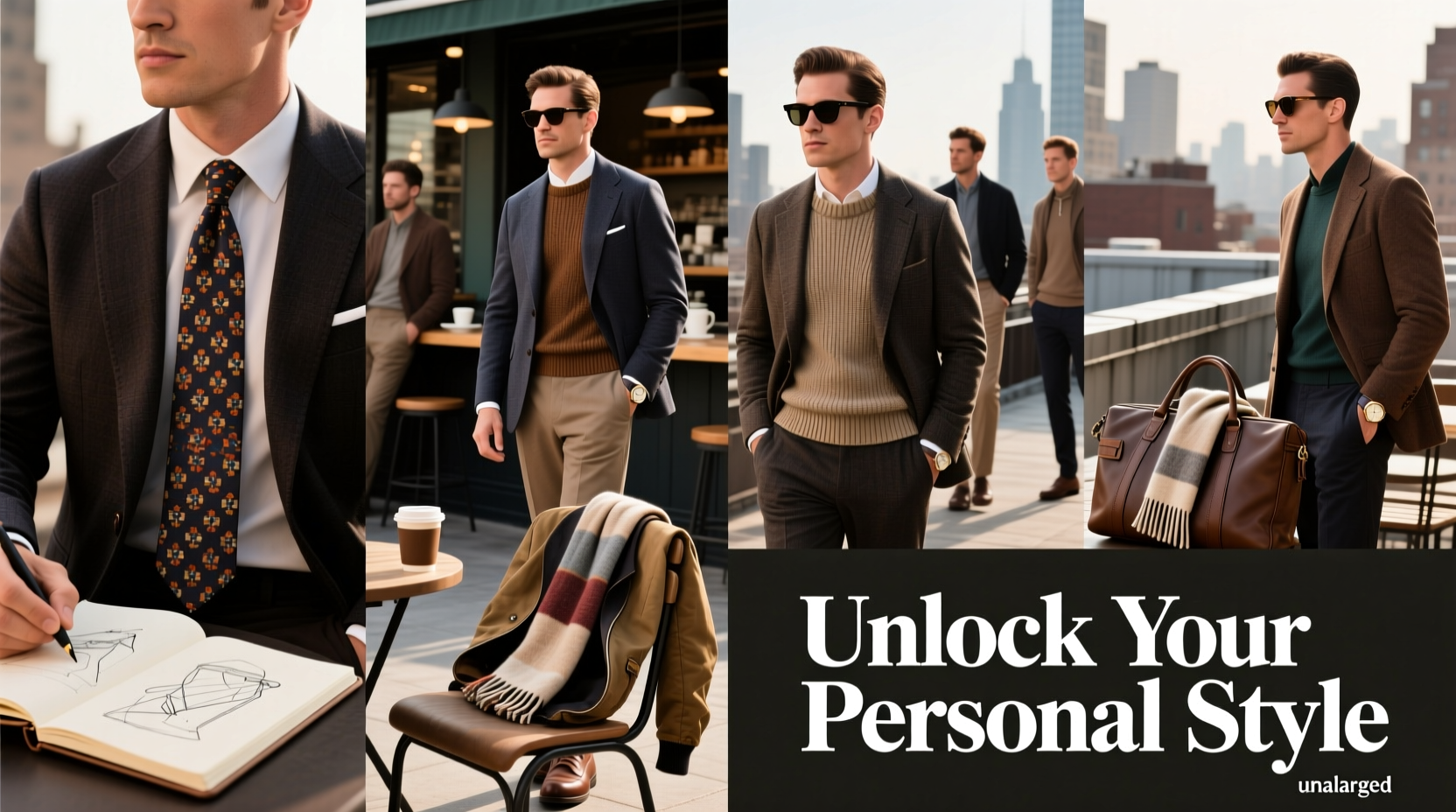Finding your personal style isn’t about chasing trends or copying influencers. It’s about self-expression—understanding who you are and letting that show through what you wear. For many men, the process feels overwhelming. Where do you start? What fits your body, lifestyle, and personality? The truth is, building a signature look is less about fashion rules and more about intentionality. With clarity, experimentation, and consistency, any man can develop a wardrobe that reflects his identity and boosts his confidence.
Step 1: Understand Your Body Type and Fit Fundamentals

Before choosing colors or styles, you must understand how clothing interacts with your physique. A well-fitting garment instantly elevates your appearance, regardless of price. The key is proportion. Men come in various body types—slim, athletic, broad-shouldered, stocky—and each benefits from different cuts and silhouettes.
For example, slim men should avoid oversized clothing, which can make them appear smaller. Instead, tailored shirts and slim-fit trousers create balance. Athletic builds often shine in structured jackets that emphasize shoulders without adding bulk. Stockier frames benefit from vertical lines, monochromatic outfits, and avoiding excessive layering, which can add visual weight.
| Body Type | Recommended Fits | Avoid |
|---|---|---|
| Slim | Slim or regular taper | Baggy jeans, boxy shirts |
| Athletic | Classic fit with room in chest | Tight sleeves, cropped hems |
| Broad/Tall | Long-line jackets, extended inseams | Short proportions, narrow cuts |
| Stocky | Straight-leg pants, V-necks | Horizontal stripes, bulky layers |
Step 2: Define Your Lifestyle and Style Goals
Your wardrobe should serve your life, not the other way around. A tech entrepreneur dressing for startup pitches needs a different approach than a creative director attending gallery openings. Start by mapping your weekly routine: How many days are casual? Formal? Active?
Ask yourself: What image do I want to project? Trustworthy? Innovative? Relaxed but put-together? Confidence comes not just from looking good, but from feeling aligned with your environment. If you’re constantly adjusting your clothes or feeling out of place, your style isn’t working for you.
“Style is knowing who you are and dressing accordingly. The most stylish men aren’t following fashion—they’re leading with authenticity.” — Daniel Sills, Menswear Stylist & Author of *Modern Gents*
Break down your week into categories: work, social, weekend, special events. Then assign a style direction to each. You might blend minimalist tailoring for the office with rugged denim and boots for weekends. The goal is cohesion, not uniformity.
Step 3: Build a Foundation with Capsule Wardrobe Essentials
Start with a core collection of versatile, high-quality basics. These pieces form the backbone of your personal style and can be mixed and matched endlessly. Think of them as your “uniform” components—reliable, timeless, and easy to wear.
- 2–3 well-fitting dress shirts (white, light blue, pale pink)
- One navy or charcoal suit (single-breasted, two-button)
- Dark wash and medium wash jeans
- Plain crewneck and V-neck sweaters (gray, black, navy)
- Leather dress shoes (oxford or derby) and clean white sneakers
- Structured overcoat or wool topcoat
- Neutral-colored chinos (khaki, olive, navy)
These items should prioritize fabric quality—natural fibers like cotton, wool, and linen breathe better and age gracefully. Avoid synthetic blends unless necessary for performance. Once the foundation is set, you can begin layering in personality-driven pieces: patterned ties, textured jackets, bold watches, or statement footwear.
Step 4: Experiment with Color, Texture, and Signature Details
This is where personal style truly emerges. After mastering fit and function, explore how color psychology and tactile elements influence perception. Navy conveys trust, burgundy adds depth, olive suggests earthiness, and black commands attention. Use accent colors in socks, pocket squares, or knitwear to test bolder choices without overcommitting.
Texture creates visual interest. A corduroy jacket, brushed flannel shirt, or cashmere blend sweater adds dimension to even the simplest outfit. Combine matte and sheen carefully—a suede shoe with wool trousers works; patent leather with velvet may clash.
Consider James, a 34-year-old architect who initially dressed strictly in gray suits. After analyzing his lifestyle, he realized his clients responded better when he appeared approachable yet professional. He introduced soft-shoulder blazers in earth tones, paired with unstructured trousers and brown brogues. His new look maintained authority but felt human. Within months, colleagues began asking for styling advice.
Step 5: Refine Through Feedback and Consistency
True style evolves through iteration. Wear an outfit, go about your day, and note how you feel. Did you get compliments? Did certain pieces chafe or wrinkle too quickly? Ask trusted friends or mentors for honest feedback. Sometimes others see patterns you miss.
Take photos of your outfits weekly. Over time, you’ll notice recurring combinations that work—these are clues to your authentic style. Eliminate pieces that cause hesitation or discomfort. Keep refining until getting dressed feels effortless.
- Wear a new combination in low-stakes settings first.
- Journal your impressions: comfort, confidence, functionality.
- Track external reactions—positive comments, double-takes, questions.
- Repeat successful pairings 3–5 times before retiring them.
- Remove underused items after 6 months unless seasonally relevant.
Checklist: Building Your Personal Style
- ✓ Assess your body type and learn proper fit standards
- ✓ Audit your current wardrobe—keep, donate, upgrade
- ✓ Identify 3 style icons whose lives resemble yours
- ✓ Define your daily dress codes (work, leisure, formal)
- ✓ Invest in 5 foundational wardrobe staples
- ✓ Add 2 personality-driven pieces (e.g., printed shirt, colored loafers)
- ✓ Test new combinations and track results
- ✓ Establish a consistent grooming and accessory routine
FAQ
How do I know if a trend is right for me?
Ask: Does this align with my lifestyle? Can I wear it more than once? Does it complement my existing wardrobe? If yes to all, try it in a lower-cost version first. Trends should enhance your style, not redefine it.
Can I have multiple styles for different parts of my life?
Absolutely. Many men successfully blend professional minimalism with creative weekend flair. The key is maintaining a thread of consistency—perhaps through footwear, grooming, or a color palette—so transitions feel natural, not jarring.
What if I live in a conservative environment?
Even in strict dress codes, personal style shines through subtle details: cufflinks, sock choice, watch strap, shirt collar crispness. Focus on impeccable fit and maintenance. Precision speaks volumes.
Final Thoughts: Style Is a Journey, Not a Destination
Your personal style will shift as you grow—new roles, relationships, and experiences shape how you want to be seen. That’s not inconsistency; that’s evolution. The goal isn’t perfection, but alignment. When your outer presentation matches your inner self, confidence follows naturally.
Start small. Master one outfit. Get the fit right. Notice how it changes the way people respond to you. Then build from there. In six months, you won’t need guides or inspiration boards—you’ll trust your own eye.









 浙公网安备
33010002000092号
浙公网安备
33010002000092号 浙B2-20120091-4
浙B2-20120091-4
Comments
No comments yet. Why don't you start the discussion?